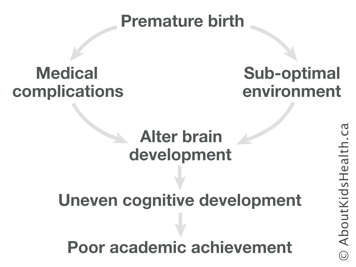Although many premature babies do not encounter any academic problems, some do. For example, up to 50% of very low birth weight (VLBW) babies will have some problems in school by Grade 3. The good news is that with early intervention, special education, and tutoring, the risk of cognitive and academic problems can be reduced, as can the severity of a learning disability.
Why do premature babies develop learning problems?

When there are medical complications at birth, an early environment that does not provide adequate stimulation and learning opportunity, or a combination of both, brain development can be altered, which can lead to uneven cognitive development and later academic problems.
Which premature children are likely to have learning problems?
There are a number of medical factors that can put premature babies at risk for later learning problems:
- periventricular brain injury such as intraventricular hemorrhage or periventricular leukomalacia
- severe bronchopulmonary dysplasia, also known as chronic lung disease, resulting in prolonged ventilation and use of supplementary oxygen
- intrauterine growth retardation (also known as fetal growth restriction) that affects brain growth in utero, resulting in a very small head size at birth
- percentile age
Other factors can also influence school success:
- A family history of learning disabilities increases the likelihood that the premature child will have learning difficulties in school.
- Infant development intervention, occupational therapy, physiotherapy and speech-language therapy can improve motor skills, cognitive, and language development.
- Nursery school can provide a stimulating environment, provide an early learning opportunity, and help children acquire age-appropriate social skills.
- Your child’s nursery school may also be able to provide you with other resources you can access, such as specialized help from a resource teacher.
- A stimulating home environment and parental involvement that includes exposure to books, games, and age-appropriate activities can facilitate the child’s development.
Your role as a parent
As your premature baby develops, there are things you can watch for and things that you can do to make certain that your child is successful in school. It is important to begin monitoring your child’s development very early on. The sooner you identify any problems and provide help, the better the outcome will be.
As a parent, there will be times you can teach your child new skills or reinforce the skills they learn elsewhere in order to help them achieve. At other times, you may have to seek out and identify the services your child will need in the community, or at school and advocate to make certain they get these services. You will also play an important role by providing encouragement for your child to practice new skills and celebrating their efforts and successes.
Many of the pages in this section of the website offer practical advice on how to fulfill these three roles.
